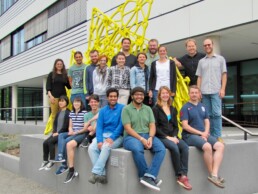
Research Focus
Using methods of single-molecule biophysics and in vitro reconstruction we study cooperative effects in motor transport and cell motility. Moreover, we apply molecular motors towards the synthesis of nanomaterials, molecular diagnostics, surface imaging and parallel biocomputation.
Stefan Diez Group
Molecular Transport in Cell Biology and Nanotechnology
Research Group Leader: Stefan Diez
Discipline: Biophysics
Affiliation: B-CUBE (TU Dresden)
Contact: stefan.diez@tu-dresden.de
Research Group Website: Diez Group
Join the group through: DIGS-BB

Current news by this research group
Stefan Diez Group,Publications
The ALS-Associated FUS (P525L) Variant Does Not Directly Interfere with Microtubule-Dependent Kinesin-1 Motility
The Diez lab, in collaboration with the Hermann lab in Rostock, Germany, have utilised an in vitro microtubule gliding motility assay to study deficient intracellular transport in motor neurons. The findings exclude a role of mutations in the phase-separating FUS protein, known to be mutated in…
Stefan Diez Group,Publications
Cytoskeletal organization through multivalent interactions
Stefan Diez and collaborators Zdenek Lansky and Marcus Braun from the Institute of Biotechnology of the Czech Academy of Sciences, Czech Republic, published an Opinion article emphasizing the role of multivalent interactions cytoskeletal phenomena including (1) the generation of entropic forces by…
Stefan Diez Group,Anthony Hyman Group,Publications
Kinetically distinct phases of tau on microtubules regulate kinesin motors and severing enzymes
The Diez and Hyman labs, in collaboration with the Lansky and Braun lab at the Institute of Biotechnology of the Czech Academy of Sciences, Czech Republic, published a study on the role of phase separation of the intrinsically disordered Tau protein in regulating the activity of motor proteins and…
Simon Alberti Group,Stefan Diez Group,Anthony Hyman Group,Marcus Jahnel Group
Local nucleation of microtubule bundles through tubulin concentration into a condensed tau phase
Theskeleton that supports the structure of our cells, termed cytoskeleton is formed of several kinds of polymers including actin and microtubules. How the single units on the polymers (monomers and dimers) are concentrated to gether to synthesize the polymer is the subject of this study by the labs…



